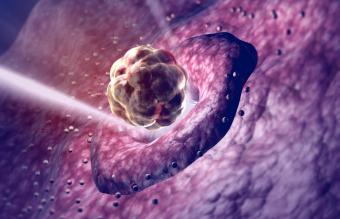
Ovulation is a critical component of conception, but it may not have much of a bearing on whether a woman has a miscarriage. Some medical professionals assume that if a woman conceives from an early ovulation, she's at higher risk of having a miscarriage, but there is some conflicting information from fertility experts.
Early Ovulation, Pregnancy and Miscarriage
The link between ovulation and pregnancy is strong, but this isn't the case with ovulation and miscarriage. The strongest link between the two is that a woman must be pregnant to experience a miscarriage. Without ovulation, a pregnancy won't occur.
Difficulty Conceiving
With early ovulation, there may be difficulty conceiving in the first place. If ovulation occurs early, before the egg becomes fully mature, there is the likelihood that it is a premature egg and of poor quality. It is less likely to be fertilized or implant within the uterus, therefore making it difficult to become pregnant. Your doctor may consider putting you on fertility drugs to lengthen your cycle for this issue. Some professionals tend to disagree on various aspects of fertility, ovulation, and miscarriage, which makes the topic confusing.
Can Early or Even Late Ovulation Lead to Miscarriage?
If a woman doesn't ovulate, she won't become pregnant, but does it really make a difference if the egg is released early or late? Two leading IVF experts offer very different perspectives of ovulation and conception, which can confuse the issue. Although conception is the main focus of their respective endeavors, the risk of miscarriage is a key component as well. If ovulating too early or too late can increase the risk of losing the pregnancy, then women trying to conceive have another stressful problem to face.
Dr. Sami David's Opinion
According Dr. Sami David's book, Making Babies, follicular phases that last longer than 20 days can deteriorate the quality of the egg and increase the risk of chromosomal abnormalities, which can lead to miscarriage.
Dr. Edward J. Ramirez's Opinion
On the other hand, Dr. Edward J. Ramirez, the executive medical director at Monterey Bay IVF Program, disagrees with the notion that longer follicular phases can increase the risk of chromosomal abnormalities. He states in his blog, "There is no connection between follicular phase length and miscarriage."
Deciphering Expert Opinions
If Dr. Ramirez is correct, ovulating too early would not increase the risk of chromosomal abnormalities and it would not relate to miscarriage. If Dr. David (who is a reproductive endocrinologist) is correct, the duration of the follicular phase plays a significant role. No matter which perspective you prefer, ovulation continues to play a primary role in conception and possibly the health of the baby. Treating and preventing ovulation problems can help.
Preventing and Treating Ovulation Problems
Although it's debatable whether early ovulation leads to miscarriage, problems with ovulation can interfere with your ability to become pregnant. A healthy pregnancy begins with ovulation and an awareness of when the event occurs each month.
Watch for Signs of Ovulation
Learn to look for telltale signs that you are ovulating and keep track of when it happens every month. Hormones play a big role, so be sure to talk to your doctor about testing progesterone levels if you think that your cycle is abnormal. If you are trying to conceive, your doctor may want to determine whether you are having anovulatory cycles (when ovulation doesn't occur at all).
Ovulation Treatments
According to the Advanced Fertility Center of Chicago, treatments for ovulation problems include:
- Ultrasound to evaluate the ovaries and determine if polycystic ovarian syndrome is present.
- Drug therapy, using medications that induce ovulation, such as Clomid.
- Bromocriptine, which may be used to treat anovulation that is caused by high levels of the hormone prolactin.
Taking a Holistic Approach
Lifestyle and holistic approaches may help, but it is crucial that you discuss any techniques that you adopt with your doctor. Getting proper sleep, moderate exercise, and a healthy diet can also be helpful. Reducing stress levels can yield good results as well.
Ovulation Supplements
Supplements like FertilAid are supposed to promote regular ovulation, according to the product's website. Although the supplement contains natural ingredients, it's still imperative that you talk to your doctor first before taking it.
Healthy Balance
There have been no clinical trials that prove early or late ovulation leads to miscarriage, but irregular cycles and unbalanced hormone levels can interfere with your ability to become and stay pregnant. Differing theories about the role the length of the follicular phase plays can make the issue a little murky, but seeing a doctor to determine if you have an irregular cycle can help put you back on track to successfully conceiving.







